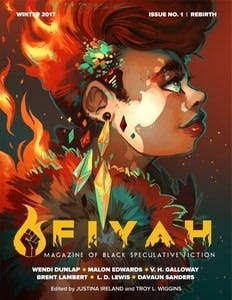The Fireside Incident: What went wrong with Fireside Magazine, and how you can support Black SFF Writers

If you’ve been paying attention to SFF/publishing Twitter lately, you’ve no doubt heard about the immensely problematic recording of “Da Art of Speculatin’” by Dr. Regina Bradley released by Fireside Magazine. Fireside has long prided itself on being a platform to raise BIPOC voices and publish anti-racist work, but this week the magazine, and specifically its publisher, Pablo Defendini, released an audio version of Bradley’s essay recorded by a white male narrator speaking in female Blackvoice. Defendini has publicly accepted responsibility for acquiring and publishing the recording. This catastrophic, racist, and sexist decision by Defendini has, rightly, caused many to question the authenticity of the Publisher’s stated mission to uplift Black creators and other artists of colour.
This is not the first time Defendini and Fireside have come under fire for failing the community. Many, myself among them, believe Defendini should step down from his position and pass Fireside to another Publisher who can better care for the community and its artists. As of this writing, Defendini has not indicated any plans to do so. At the very least, it’s clear there has to be layers of approval, and as Joseph Tomaras pointed out on Twitter, it’s a problematic commonality within SFF short fiction for Publishers to also fill the role of Editor-in-Chief, holding them accountable to no one when editorial mistakes happen.
And this was no mere whoopsie-doodle.
Defendini has released a statement to apologize for the recording, attempt to explain how and why it happened, and outline what steps will be taken to ensure it doesn’t happen again. However, he does not explain his initial decision to hire a white male narrator to record a story written by and in the voice of a Black woman. Many actively harmful choices and actions went into this before the final mistake of hitting “publish” without listening to the delivered file.
Publishing is already so violently unsafe for Black Women and there are so few places that even pretend to be aware of that fact. @FiresideFiction was one of them, emphasis on the past tense. This is so wildly disappointing and hurtful and racist.
— Daniel José Older he/him (@djolder) 2:46 AM ∙ Nov 25, 2020
As Older says in the tweet above, Fireside was once considered one of the leading publishers for anti-racist material, a place that was not only safe for Black women and other writers of colour, but actively championed their work and created space for them in a community and genre buried under decades of prominent work by white men.
On Twitter, Bradley said:
AHT AHT Fireside. I feel erased with a white guy reading my piece being about being southern Black woman listening to OutKast. I was available. The piece LITERALLY STARTS WITH “I’m a southern Black woman who stands in the long shadow of the Civil Rights Movement.” 🙄🙄🙄🤔🤔🤔 https://t.co/CfZFhBMnK9
— Zora Neale Thirston (@redclayscholar) 2:08 PM ∙ Nov 24, 2020
Bradley’s essay is still available to read on Fireside’s website, and is uniformly excellent.
If you’d like more context, reaction, and understanding of the situation, I recommend these tweets/threads: Tressie McMillan Cottom, Daniel José Older, Sarah Gailey, Roxane Gay, and Merc Fenn Wolfmoor.
And, because my words as a white male can’t capture the harm and violence of such actions, I’ll leave you with Dr. Bradley’s:
I saw the apology. I don't care. I am angry. Seething from centuries of silenced Black women angry. The voice I speak with and write with is not my own. To have that taken away is unacceptable. Unforgivable. And to ask me to consider it is equally trifling and unforgivable.
— Zora Neale Thirston (@redclayscholar) 9:21 PM ∙ Nov 24, 2020
Support FIYAH Literary Magazine

All of this is to say that today feels like a very good day to subscribe to FIYAH Literary Magazine, a literary speculative fiction publication that, in their own words, “features stories by and about Black people of the African Diaspora.” It’s one of the best genre magazines available right now, and publishes many of the year’s most exciting and interesting stories.
If it fits your budget, please consider subscribing, gifting a subscription, or making a donation to support Black voices in SFFH.
If you’re interested in learning more about Black genre fiction, author Nisi Shawl has a tremendously useful crash course on the history of Black science fiction, and she also has an excellent complementary piece on Tor.com called “Take a Tour Through the History of Black Science Fiction,” and a monthly column of the same name. Additionally, the Carl Brandon Society, named after a fictional Black SFF fan writer, is an organization that seeks to “help build further awareness of race and ethnicity in speculative literature and related fields.” Each year, it awards The Octavia E. Butler Memorial Scholarship, which creates opportunity for writers of colour to attend Clarion writing workshops.
And, as always, read broadly, and seek works written by people outside of your lived experience, and share them with others. SFFH features a vibrant, thriving community of Black voices that deserve to be celebrated.

